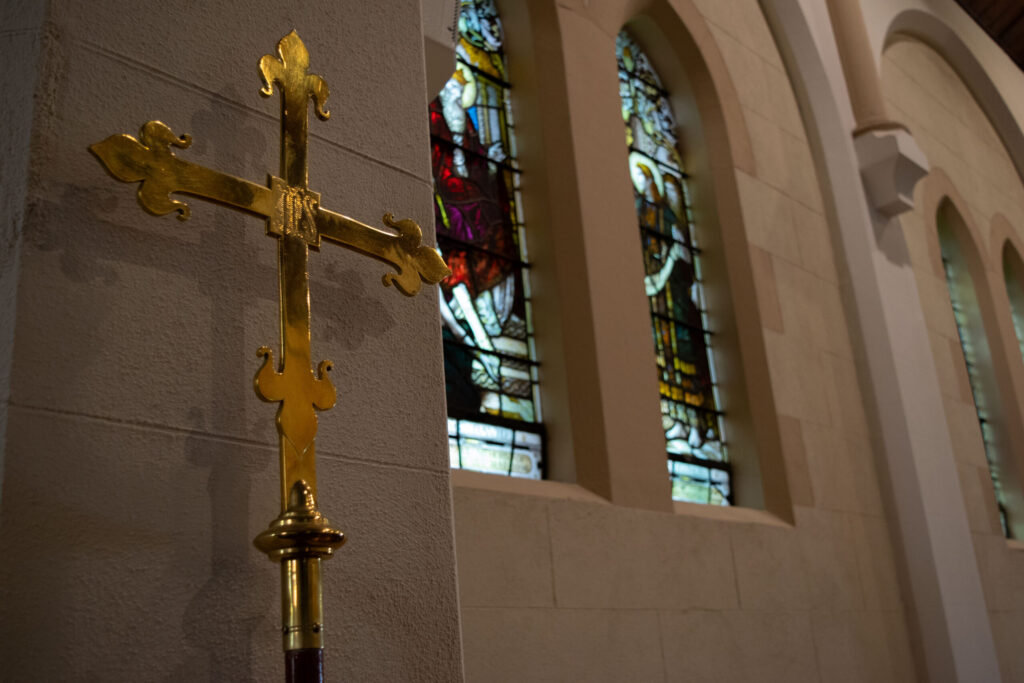Sermon – Luke 18:1-14
Sermon Preached by Reverend Tracey Gracey on Sunday, 20 October, 2025
John Shea once retold the parable of the Pharisee and Tax Collector in a way that makes us smile — and think.
A priest and a deacon stand at the altar praying together.
The priest says, “Lord, have mercy on me, a sinner.”
The deacon joins in, “Lord, have mercy on me, a sinner.”
Then, from the back of the church, they see and hear the cleaner —
head bowed, beating his chest — saying,
“Lord, have mercy on me, a sinner.”
The priest turns to the deacon and says,
“Look who thinks he’s a sinner.”
I wonder – is there a Pharisee and a tax collector in all of us?
Today’s Gospel reading gives us two parables about prayer and faith.
One is about persistence: a widow who refuses to be silent until justice is done.
The other is about posture: a tax collector who can barely lift his eyes to heaven.
Together, they ask a deeper question:
How do we come before God?
Do we come to convince, or to confess?
To be seen, or to be changed?
Both parables expose the difference between religious habit and a genuine relationship with God.
One speaks of active faith that pursues justice; the other, of humble faith that seeks mercy.
This morning, Jesus begins with the story of the widow.
In Hebrew, the word for widow means “silent one.”
But this woman refuses to be silent.
She’s got no husband, no lawyer, no protection — only her voice.
And she uses it every day, in public, confronting a judge who doesn’t care about God or people.
The judge isn’t moved by compassion — he’s moved by fear of public shame.
In today’s Gospel reading, the judge says he will grant the widow justice so that she will not “wear him out by continually coming.”
This phrase literally translates from the Greek as [and it sounds strange] “so that she will not give me a black eye”
This statement isn’t about physical abuse, but about reputation.
In the honour–shame world of ancient times, [which I have spoken about before] public standing was everything.
To “get a black eye” meant your honour had been struck —
your credibility damaged, your pride exposed.
So this judge, who prides himself on appearing just, fears being unmasked as unjust.
The widow — powerless, disregarded, and socially invisible,
uses the only weapon she has: her voice.
Day after day she calls him out, refusing to let him hide behind his title.
And though he claims not to care what people think, he finally gives in because her persistence threatens his public image.
He grants her justice — not because he’s good, but because she’s uncovered his hypocrisy.
And that’s the point Jesus makes:
If even an unjust, self-serving man eventually gives way to protect his reputation, how much more will a loving and merciful God listen to those who cry out day and night.
The Pharisee and the tax collector both come to pray —
but their prayers couldn’t be more different.
The Pharisee’s prayer is really a speech about himself.
He tells God all the things he’s done well, not as confession,
but as confirmation, certain that his goodness speaks for itself.
The tax collector, on the other hand, stands far off.
He won’t even look up.
He beats his chest, which is an ancient sign of sorrow,
and says the only words he can manage:
“God, have mercy on me, a sinner.”
To cry out for mercy isn’t about begging or trying to win God’s pity, it’s about speaking truthfully before God.
It’s coming without pretence or defence, knowing that God’s mercy meets us not at the point of our success, but in the midst of our need.
It’s also an act of faith.
For it is to believe that God remains faithful even when we feel we are not.
Mercy isn’t a deal we make with God — it’s an encounter with a God who loves us – no matter what.
Julian of Norwich wrote,
“The property of mercy is to love, to forgive, and to restore.”
Dorothy Day said,
“The mercy of God is a mysterious thing.
It lifts us up when justice might have left us fallen.”
The widow cries out for justice; the tax collector cries out for mercy,
but both are praying for the restoration of what is broken, in society and in the self.
These two stories belong together.
One prays for justice, one prays for mercy, and both reveal what mature faith looks like.
– Faith that acts when wrong must be challenged.
– Faith that repents when wrong must be acknowledged.
God’s justice and mercy aren’t opposites, they are two movements of the same divine purpose, to draw humanity into right relationship with God and one another.
And that is the depth of prayer, not that we change God,
but that through prayer, God changes us, forming us in mercy and shaping us for justice.
The widow teaches us to keep speaking,
to name injustice and to seek what is right.
The tax collector teaches us to keep returning,
to seek forgiveness and renewal from God.
Together they show that true prayer is not about status or style,
but about alignment, bringing our hopes and desires into harmony with God.
I wonder – Is there a widow, a Pharisee, and a tax collector in all of us?
The part in us that keeps speaking up for what is right,
the part in us that stands a little too sure of ourselves,
and the part in us that knows their need for mercy.
Be assured that faith holds all three —
and prayer is where they meet.
It’s where persistence, honesty, and humility come together,
and where God listens, heals and restores.
Amen

